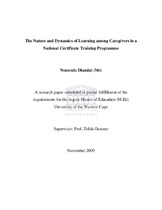| dc.description.abstract | In this research study I investigate the nature and dynamics of learning amongst learners in a National Certificate Training Programme for community health workers who are caregivers in a home-based care prgoramme. The study analyses the relationship between experience, participation and learning and seeks to establish how the experience of adult learners can be mobilised through active participation and how situational conditions can either facilitate or inhibit participation and learning amongst the learners. Another dimension of the study seeks to establish what caregivers learn and the processes through which they learn and how such learning contributes to changes in behaviour and relationships. In this study, the nature and dynamics of learning amongst adult learners in the NCTP programme at community level is explored as an example of socio-cultural
theory and situated learning which hold that learning results from participation in various socio-cultural situations – the act of participation is seen as crucial in the learning. The study focused on a group of 10 learners in the National Certificate Training Programme for community health workers who are also caregivers in the Nokuthembeka Home-based Care Programme in New Crossroads in the Cape Town metropole and used a qualitative research design and interpretive approach to understand the situations in which they learn. An interpretive approach allowed for deeper insight into the socio-cultural contexts that influence the social interactions of caregivers with peers as well as their learning. In the study I argue that the experience of caregivers forms a critical resource and the foundational basis for learning. The research study confirmed that the training programme in which caregivers interact and engage with peers and facilitators creates a learning context and that active participation in the situation facilitates learning. The
study further confirmed that the informal settings of the home and community are
important sites for learning and gaining experience and that situational conditions such as language, personal attributes and culture of learning/teaching can influence participation and learning. | en_US |

